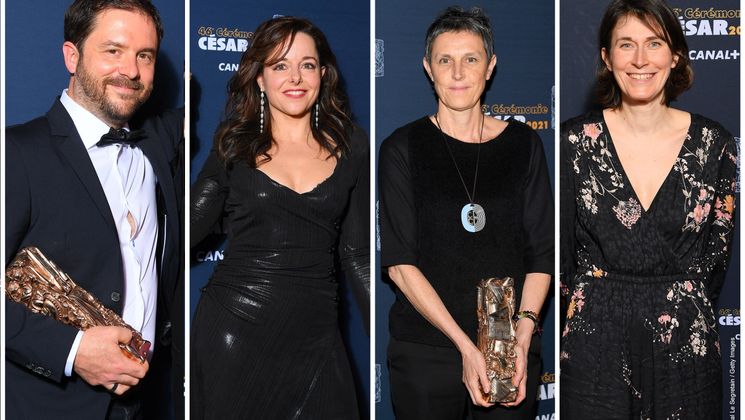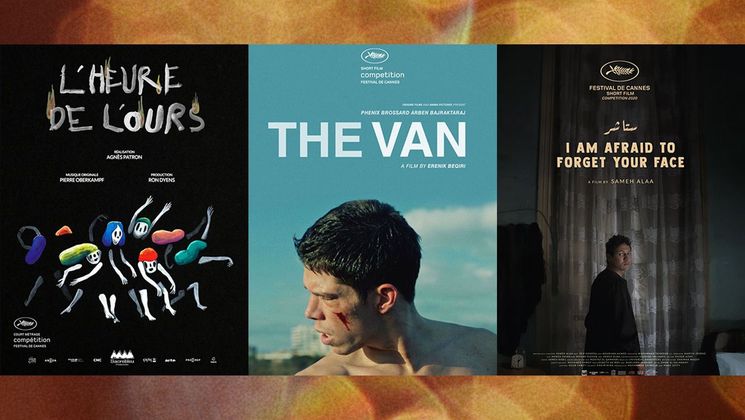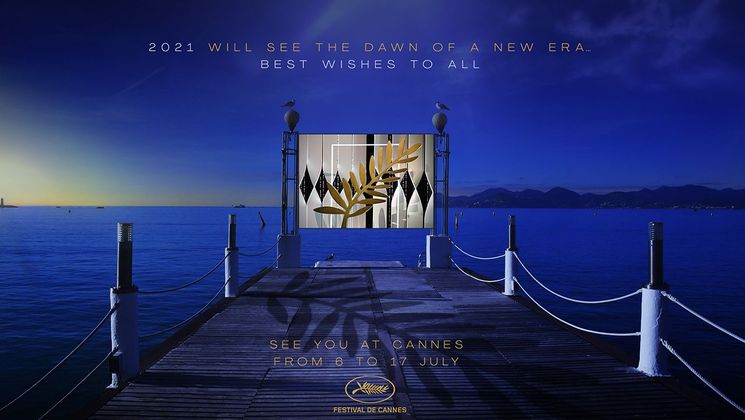
Palme d’or: the 1990s

Throughout the 90s, the Cannes Selection continues to create a dialogue between cinemas around the world, where films by Chen Kaige from Hong Kong rub shoulders with those by Iranian Abbas Kiarostami and by Theo Angelopoulos from Greece. In 1993, the Palme d'or is awarded to a woman for the the first time, for The Piano by Jane Campion. In 1997, the Festival celebrates its 50th anniversary by creating a special prize to mark the occasion. The Palm of Palms, chosen by all of the previous Palme d'or-winning directors, is awarded to Ingmar Bergman, in recognition of his entire career.
Let's take a look back at a decade of Palme d'or winners you can watch and rewatch at home.
Wild at Heart BY David Lynch (1990)
Wild at Heart is the story of passionate, burning love between two young, American misfits, Lula and Sailor, played by Laura Dern and Nicolas Cage. On the run from Lula's mother, who disapproves of their relationship, the couple make their escape, but have many unnerving encounters along the way, in this dark, sexy, off-the-wall road movie. David Lynch adpats a novel by Barry Gifford for this, his fifth feature film. He would later collaborate with Gifford on the screenplay for Lost Highway (1997).
► (Re)discover the film on VOD
Barton Fink BY Joel AND Ethan Coen (1991)
It's 1941 and Barton Fink (John Turturro) is a young New York playwright. He is encouraged by his agent to try his luck in Hollywood and lands a contract to write a B-movie about the world of wrestling. He stays in a sinister hotel where he meets a tortured writer, Charlie Meadows (John Goodman).
For this, their fourth feature film, the Coen brothers win the Palme d'or and the prizes for best director and best actor for John Turturro. It is the first film to garner three of the major awards at Cannes and the last to do so, because of the controversy that followed.
► (Re)discover the film on VOD
Den Goda viljan (The BEST INTENTIONS) BY Bille August
Sweden, 1909. Henrik Bergman, a young theology student, falls in love with Anna, a rich heiress. The first ten years of their relationship are marked by the violent opposition of Anna's parents, which leads to dramatic conflicts.
In 1987, Ingmar Bergman publishes his autobiography, Laterna Magica. He then takes up his parents story again when he writes the screenplay for The Best Intentions. Ingmar Bergman "could envisage no one but Bille August" to bring his family story to the screen. Pernilla August wins the best actress award, while Henrik Bergman is played by Samuel Fröler.
► (Re)discover the film on VOD
霸王別姬, BAwAng biEjI (FaREWELL MY CONCUBINE) BY Chen Kaige (1993)
Chen Kaige describes Farewell my concubine as "a story of seduction and betrayal" which portrays life in China between 1924 and 1979. Douzi et Xiaolou become friends as children at the Peking Opera academy. Their life is devoted to interpreting the leading roles of the famous opera Farewell my concubine, while behind the scenes intimate dramas play out, influenced by the Cultural Revolution. Led by Leslie Cheung and Gong Li, Farewell my concubine is the first Chinese film to win the Palme d'or, which it did jointly with Jane Campion's The Piano.
► (Re)discover the film on VOD
The Piano BY Jane Campion (1993)
During the 19th century Ada MacGrath (Holly Hunter) and her daughter Flora (Anna Paquin) sail from Scotland to New Zealand, where Alistair Stewart (Sam Neill) is waiting for them. He has brought Ada there in order to marry her. The young woman only communicates by signing and has crossed the seas with her precious piano. When the instrument is bought by their neighbour, played by Harvey Keytel, an ambiguous relationship begins between Ada and her blackmailer.
"My films are a reaction agains society's obsession with normality, its propensity to exclude deviants", Jane Campion says in relation to this love story inspired by 19th century romanticism, for which Holly Hunter won the best actress award.
► (Re)discover the film on VOD
Pulp Fiction BY Quentin Tarantino (1994)
Following his first feature film Reservoir Dogs (1992), Quentin Tarantino electrifies the Croisette with Pulp Fiction. "It's an epic in every aspect – inventiveness, ambition, length, composition – except the cost."
Three ganster stories intertwine in Los Angeles: a couple of apprentice armed robbers (Tim Roth and Amanda Plummer); two killers for hire named Vincent Vega and Jules Winfield (John Travolta and Samuel L. Jackson) as well as their boss' drug-user wife, Mia Wallace (Uma Thurman); and Butch, (Bruce Willis) a shady boxer.
► (Re)discover the film on VOD
Подземље, Podzemlje (Underground) BY Emir Kusturica (1995)
Adapted from the theatre play Proleće u januaru (Spring in January) by screenplay co-writer Dušan Kovačević, the film follows the fates of three individuals in the former Yogoslavia, from 1941 to 1995. During the first bombing of Belgrade, Blacky (Lazar Ristovski) and Natalija (Mirjana Jokovic) shelter in a cellar belonging to Marko (Predrag 'Miki' Manojlovic). Over several decades, Marko convinces them the war is still going on and keeps them shut away.
"Underground is my most important film, I put my whole heart into it." Emir Kusturica stated about his second Palme d’or.
► (Re)discover the film on VOD
Secrets and Lies BY Mike Leigh (1996)
Following the death of her adoptive mother, Hortense (Marianne Jean-Baptiste), a 27-year-old black woman, sets out to find her biological mother. She is amazed to find that Cynthia (Brenda Blethyn, best actress award) is white and lives with her 20-year-old daughter, Roxanne.
"Although cinema is not at all naturalistic, the key thing is to share the impression with the audience that it is a real world which resonnates with their lives: that chemistry is, for me, a political and social process." Mike Leigh
► (Re)discover the film on VOD
طعم گیلاس, Ta'm-e gilās (TASTE OF CHERRY) BY Abbas Kiarostami (1997)
When he wins the Palme d'or in 1997, Abbas Kiarostami is an Iranian director, unknown to the general public and so short of resources that he writes, directs, edits and produces his films himself. Taste of Cherry portrays the wandering of a man in despair (Homayun Ershadi) who roams the Tehran suburbs in his car, searching for someone who will agree to bury him after he commits suicide. As his path crosses with several people, he strikes up conversations which form a humanist tale of life and death.
► (Re)discover the film on VOD
うなぎ, Unagi (THE EEL) BY Shōhei Imamura (1997)
The Palme d’or joint winner in 1997, The Eel is adapted from a short story by Akira Yoshimura.
After serving eight years behind bars for his wife's murder, Takuro (Kôji Yakusho) opens a barber shop in a Tokyo suburb. He is a strange, taciturn character, who barely communicates, apart from with the eel which he tamed while he was in prison. His bleak existence is transformed by a young woman, Keiko (Misa Shimizu), who he saves from suicide, but her sensuality disturbs him.
Μια αιωνιότητα και μια μέρα, Mia eôniótêta kai mia méra (ETERNITY AND A DAY) BY Theo Angelopoulos (1998)
In 1998, the Greek filmmaker Theo Angelopoulos is at the peak of his career when he receives the Palme d'or for Eternity and a Day. The idea for the film comes to him after losing two close friends: the production designer Mikes Karapiperis, and the actor Gian Maria Volonté, who died during the shooting of Ulysses' Gaze (1995). What would they have done if they could have lived for one more day?
The filmmaker tells the story of the last moments in the life of Alexander, a writer who knows he is dying, played by Bruno Ganz. His touching meeting with an oprhaned illegal immigrant interweaves with reminiscenses from his past.
► (Re)discover the film on VOD
Rosetta BY Luc AND Jean-Pierre Dardenne (1999)
Eighteen-year-old Rosetta (Emilie Dequenne, best actress award) fights back when she hears she has been sacked from her factory job. She lives in a caravan on waste ground with her alcoholic mother. Struggling to escape poverty and to have a "normal" life, she takes a series of odd jobs and refuses to accept any charity. She is taken on by Riquet (Fabrizio Rongione) to sell waffles.
"We search in places, faces, bodies, clothes, for a mix, a vagueness, particular to our age," the Dardenne brothers say.


